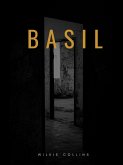9525--Collins's works were classified at the time as "sensation novels, " a genre seen nowadays as the precursor to detective and suspense fiction. He also wrote penetratingly on the plight of women and on the social and domestic issues of his time. For example, his 1854 Hide and Seek contained one of the first portrayals of a deaf character in English literature. As did many writers of his time, Collins published most of his novels as serials in magazines such as Dickens's All the Year Round an
Bitte wählen Sie Ihr Anliegen aus.
Rechnungen
Retourenschein anfordern
Bestellstatus
Storno









